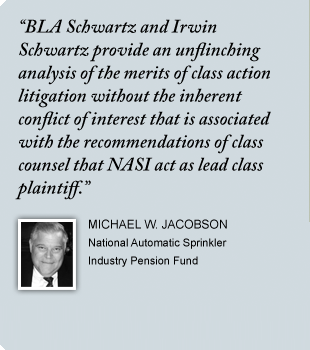
Institutional Investors and Class Actions
Class actions are packed with competing interests. BLA Schwartz objectively evaluates the options facing institutional investors, including whether to act as lead class representative, to opt out of proposed settlements, and to object to the proposed settlements and fee awards.
BLA Schwartz scrutinizes class actions detached from the economic forces that underlie the class-action industry in which class counsel monitor institutional investor portfolios and receive massive benefits based on who brings the largest shareholder to court. Institutional investors need an independent advocate from the outset of these cases through settlement approval, which frequently lacks any adversarial process.
We have experience appearing as objector counsel for class members who believed there was a flaw in a particular class action settlement process, particularly on due process issues, including in the following matters:
- UCFW Local 880-Retail Food Emp’rs Joint Pension Fund v. Newmont Mining Corp., Civil Action No. 05-cv-01046-MSK-BNB (D. Col. Aug. 6, 2008) (dramatically reduced fee award (from $3 million to approximately $500,000), thereby preserving at least $2.5 million for the class).
- In re Leapfrog Sec. Litig., No. C-03-05421, slip op. at 4 (N.D. Cal. Jul. 14, 2008) (objection to settlement fairness hearing briefing schedule resulting in court holding “An objector should not have to object to specifics, e.g., the amount of attorney’s fees, prior to seeing how those fees are computed and supported.”).
- New England Carpenters Health Benefits Fund v. First Data Bank, Inc. and McKesson Corp., Civil Action No. 05-11148 PBS (D. Mass.) (successful objection resulting in class counsel’s agreement to forfeit to the common settlement fund approximately $1.2 million that class counsel intended to take for fees and expenses and recovering over $600,000—from class counsel for settlement of appeal to First Circuit).
- In re Maxim Integrated Prods., Inc. Sec. Litig., No. C-08-00832-JW, slip op. (Oct. 15, 2010) (successful objection that four days was not sufficient time to evaluate the fee application before objections were due leading to court ruling that class members had been deprived of due process).

